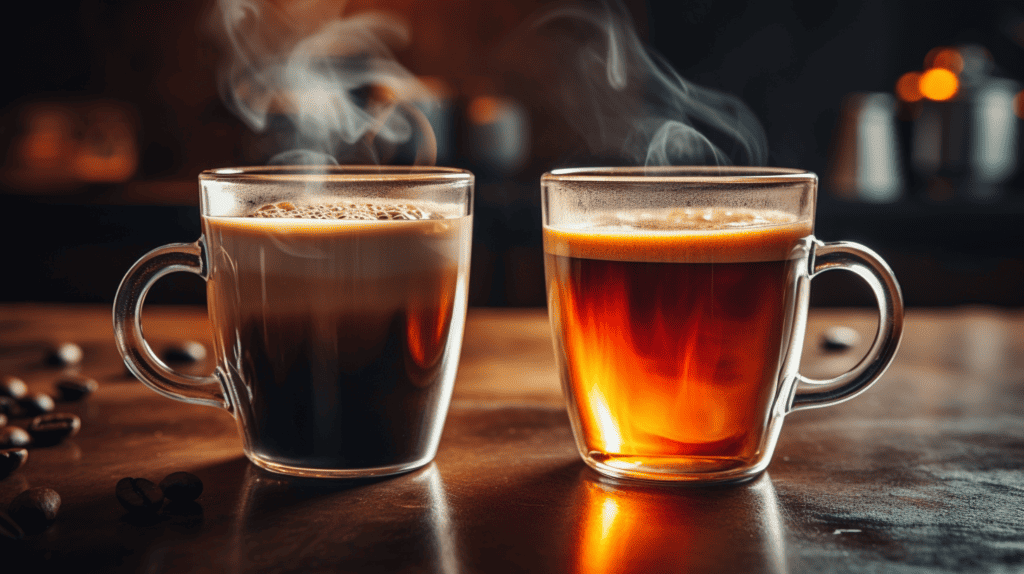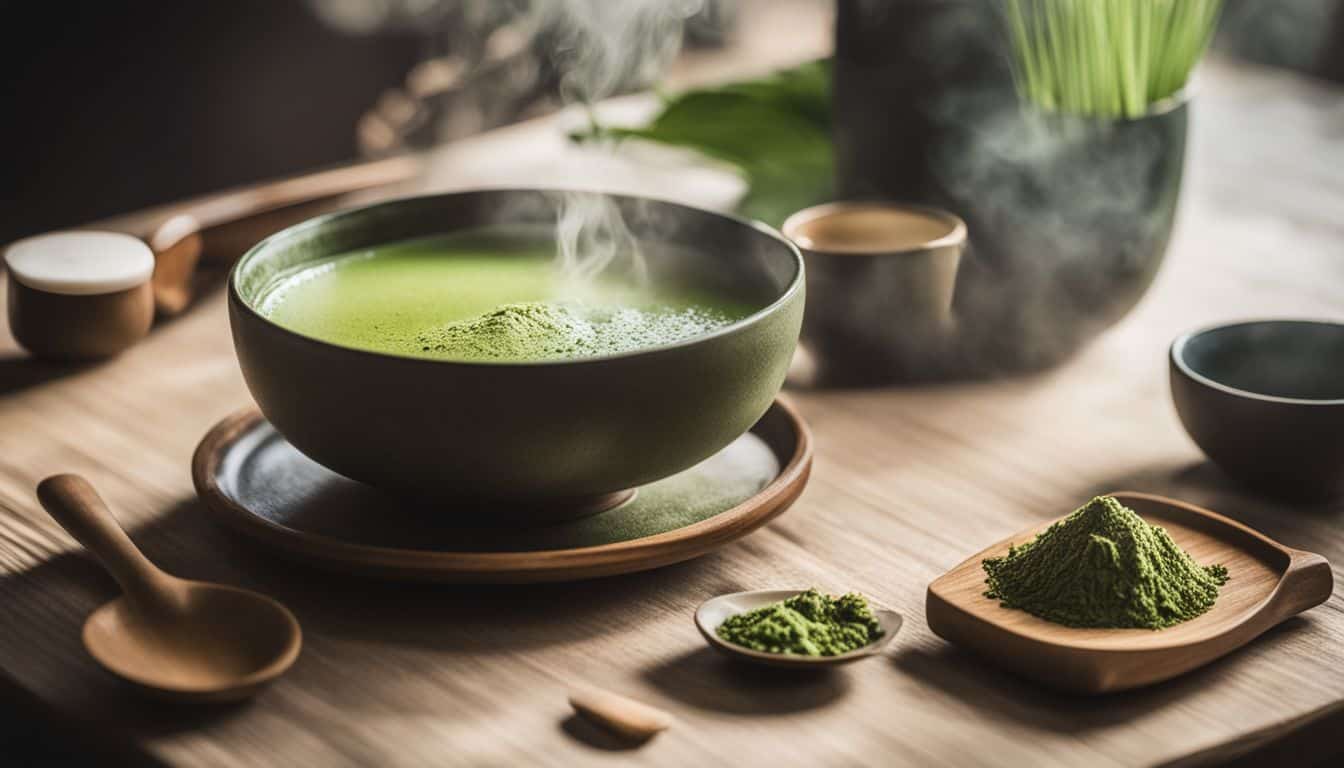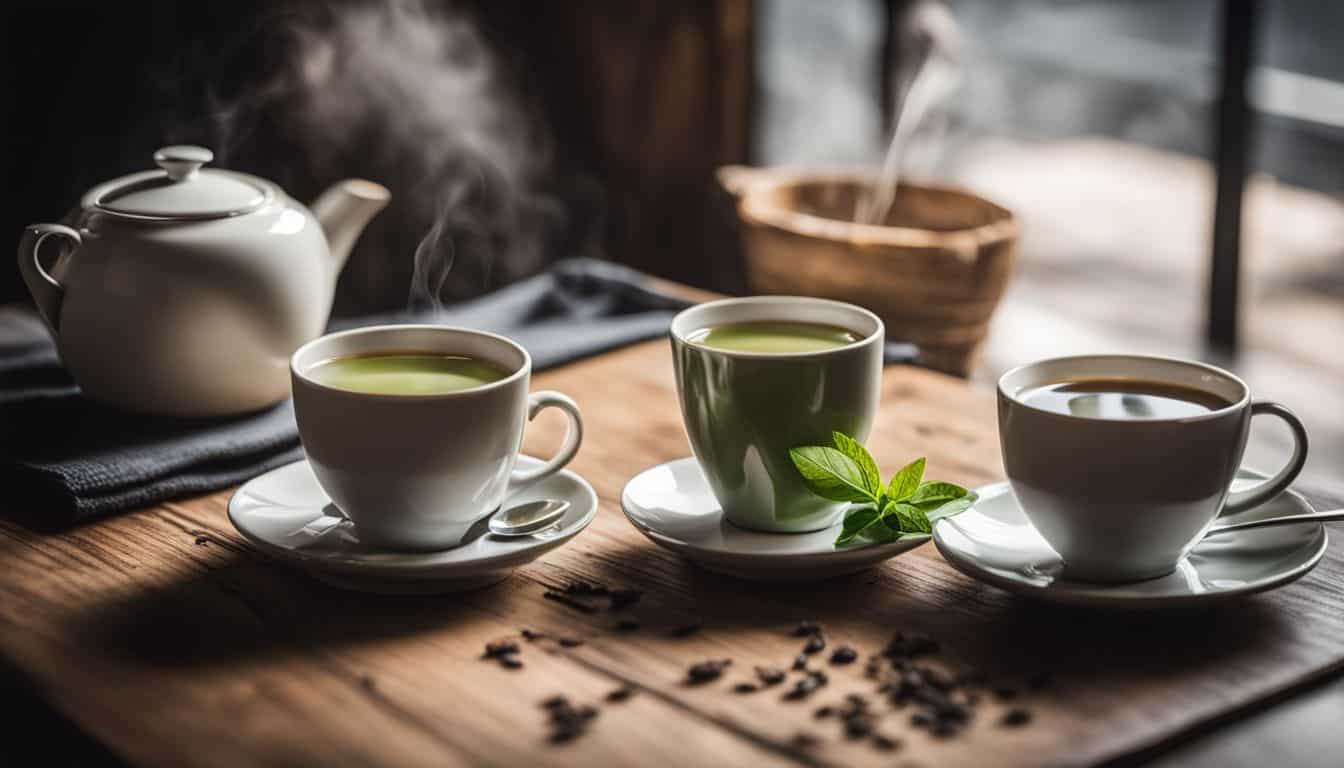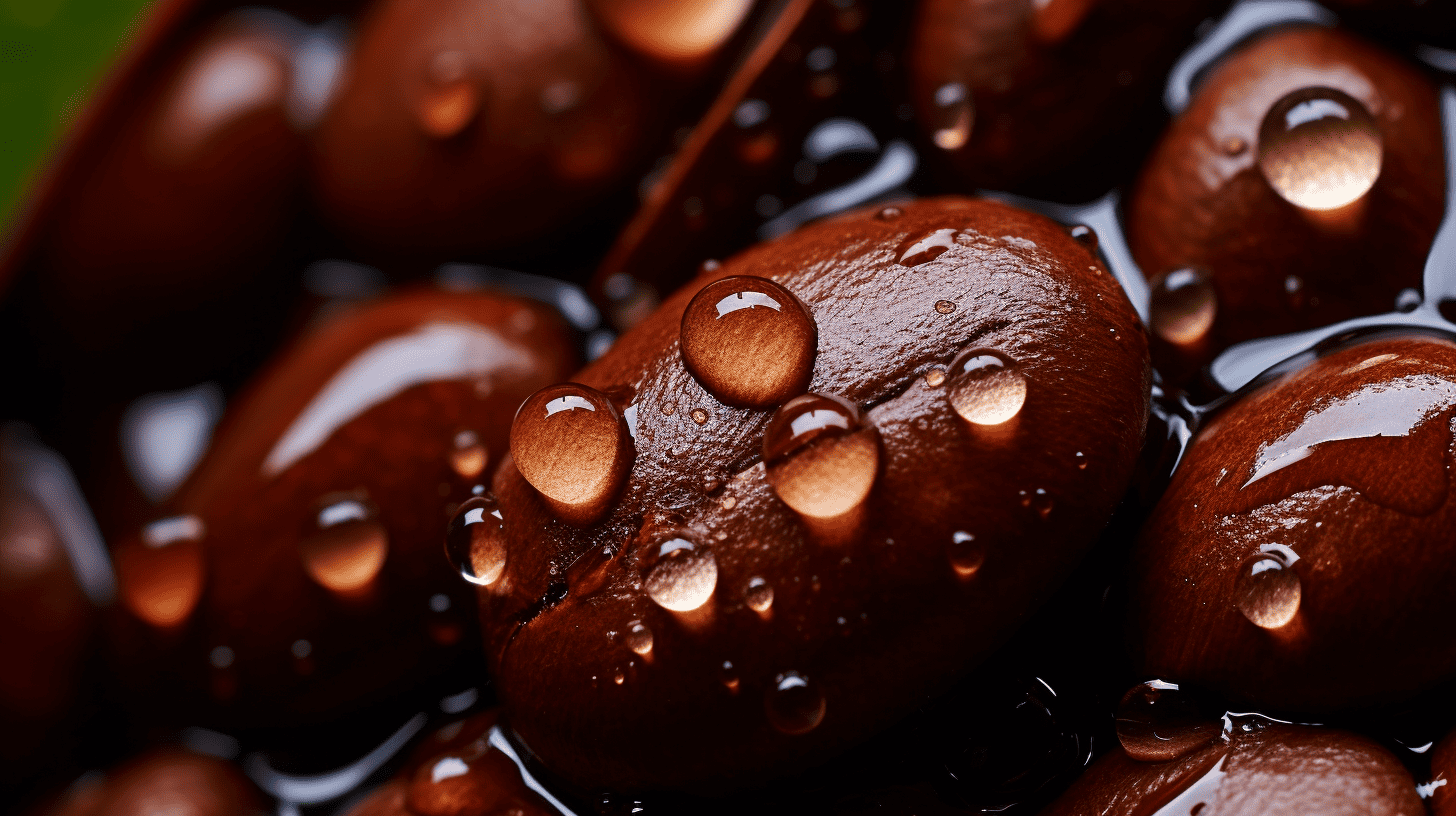Have you ever sat at your breakfast table, torn between reaching for your regular cup of coffee vs matcha? I’ve been there too, and believe it or not, this is a common dilemma many face.
As someone who’s explored both these beverages extensively, let me share a fascinating fact: Matcha contains plant phytonutrients that slow the release of caffeine providing sustained energy compared to coffee.
This post is packed with insights on the nutritional values, benefits, tastes and potential drawbacks of both coffee and matcha – keying you into which might be your perfect morning pick-me-up.
Ready to embark on this caffeinated journey?
Key Takeaways
- Matcha contains plant phytonutrients that slow the release of caffeine, providing sustained energy compared to coffee.
- Both matcha and coffee offer shared benefits such as weight loss support and a high antioxidant content.
- Matcha has a grassy and earthy taste, while coffee provides a bold and bitter flavor.
- Coffee typically contains more caffeine than matcha, but matcha provides a more sustained energy boost without the crash.
- Matcha is gentler on the stomach compared to coffee and may have additional benefits for skin health.
- Matcha offers a healthier caffeine hit with an array of health benefits but may be an acquired taste for some individuals. There is also a potential for higher lead content in certain varieties.
- Coffee has a familiar flavor and higher caffeine content, potentially providing cognitive benefits, but it can be acidic and may lead to addiction and withdrawal symptoms.
Coffee Vs. Matcha Comparison Table
| Aspect | Coffee | Matcha |
|---|---|---|
| Caffeine Content | On average, a cup of coffee contains about 95 mg of caffeine | On average, a cup of matcha contains about 70 mg of caffeine |
| Calories | Almost zero calories | Contains 5 calories per 2-ounce serving |
| Sugar Content | Depends on personal preference and added sweeteners | Contains no sugar |
| Vitamins | Contains less vitamins compared to matcha | Contains high levels of antioxidants and vitamins, including Vitamin C, Vitamin A, and potassium1 |
| Taste | Offers a wide variety of flavors and brewing methods | Has a unique, earthy taste |
| Health Considerations | Can be a healthier choice when consumed without added sugar | Matcha is considered to be more beneficial than coffee overall, as it contains high levels of antioxidants and has fewer potential side effects |
It’s important to note that the caffeine content in coffee can vary depending on factors such as the type of coffee bean, brewing method, and serving size. Additionally, individual tolerance to caffeine may vary.
Ultimately, the choice between coffee and matcha depends on personal preference, caffeine tolerance, and health considerations. Coffee is a natural source of caffeine and offers various flavors and brewing methods.
On the other hand, matcha provides a unique taste and is considered healthier than coffee overall due to its high levels of antioxidants and vitamins. It’s recommended to consume both coffee and matcha in moderation and consider individual health needs and preferences.
Comparison List:
- Matcha provides sustained energy due to its slower release of caffeine, making it an excellent alternative to coffee.
- Both matcha and coffee offer weight loss support and antioxidants.
- Matcha has a unique grassy taste, while coffee is bold and bitter.
- Coffee has more caffeine than matcha but can cause acidity issues in some people.
- Matcha offers additional skin health benefits with high levels of antioxidants.
- Consider personal preferences when choosing between matcha or coffee – both have their advantages.
Nutritional Comparison and Shared Benefits
Matcha and coffee have different nutrient compositions, but they both provide shared benefits such as weight loss support and a high antioxidant content.
Nutrient composition of matcha and coffee
As a coffee enthusiast, I appreciate the unique qualities each of these drinks possess. Here’s a detailed look at the nutrient composition of matcha and coffee.
| Matcha | Coffee | |
|---|---|---|
| Caffeine Content | 70 mg per gram | 95 mg per 8-ounce cup |
| Acidity Level | Lower (more alkaline) | Higher |
| Impact on Blood Sugar Levels | Helps stabilize | Can cause fluctuations |
| Caffeine Release | Slow and sustained | Quick and potential for crash |
| Effect on Anxiety | Less likely to cause jitters/anxiety | Potential to induce anxiety |
| Health Benefits | Boosts metabolism, enhances detoxification, supports immune function | Potential cognitive benefits |
| Antioxidant Content | Rich in catechins | Varies |
| Effect on Digestion | Gentler on the stomach | Can cause digestive issues in some individuals |
Both drinks possess unique properties and offer benefits. Your personal preference may ultimately determine whether matcha or coffee is your go-to beverage.
Shared benefits such as weight loss and antioxidant content
Both matcha and coffee offer shared benefits when it comes to weight loss and antioxidant content. Matcha is rich in antioxidants, especially catechins, which are known for their ability to combat free radicals and reduce the risk of chronic diseases.
These antioxidants can also help boost metabolism and support weight loss efforts. Coffee, on the other hand, contains its own unique set of antioxidants that provide similar health benefits.
Additionally, both matcha and coffee can provide a natural energy boost to keep you alert throughout the day. So whether you prefer a warm cup of matcha or a freshly brewed coffee, you can enjoy these shared benefits while savoring your favorite drink.
Additional benefits of matcha such as improved skin health
One of the additional benefits of matcha is that it can improve skin health. Matcha contains antioxidants called catechins, which have been linked to promoting clear and healthy skin.
These antioxidants help protect the skin from damage caused by free radicals, reduce inflammation, and prevent signs of aging such as wrinkles and fine lines. By incorporating matcha into your daily routine, you can nourish your skin from within and achieve a glowing complexion.

Main Differences between Matcha and Coffee
Matcha and coffee have distinct flavor profiles and aroma, with matcha offering a grassy and earthy taste while coffee provides a bold and bitter flavor.
Flavor profiles and aroma
The flavor and aroma of matcha and coffee are quite different. Matcha has a vibrant, grassy taste with a slightly sweet undertone. It has a smooth, creamy texture that is often described as “umami.” On the other hand, coffee has a rich, bold flavor with varying degrees of bitterness depending on the roast.
Its aroma can range from earthy to nutty or even fruity. So if you prefer a refreshing and unique taste, matcha might be your go-to choice. But if you enjoy the robustness and depth of flavor that coffee offers, then stick with your regular cup of joe.
Caffeine content and effects on the body
Coffee and matcha differ in terms of their caffeine content and how they affect the body. Coffee typically contains more caffeine than matcha. An 8-ounce cup of coffee has around 96 mg of caffeine, while matcha contains about 19-44 mg per gram.
The effects of caffeine also vary between these beverages. Matcha provides a more sustained energy boost compared to coffee because it contains plant phytonutrients that slow down the release of caffeine into the body.
This results in a longer-lasting sense of alertness without the sudden crash that can be experienced with coffee.
Additionally, matcha promotes relaxed alertness, making it a better choice for those who want an energy boost without feeling jittery or anxious. On the other hand, some individuals may experience digestive issues from drinking coffee, whereas matcha is generally gentler on the stomach.
Pros and Cons of Matcha
Matcha offers a healthier caffeine hit with an array of health benefits, such as improved energy levels and enhanced cognitive function. Additionally, matcha is better for oral health due to its high antioxidant content.
However, it may be an acquired taste for some individuals and there is a potential for higher lead content in certain varieties.
Pros: healthier caffeine hit, array of health benefits, better for oral health
In my opinion, matcha offers a healthier caffeine hit compared to coffee. It provides sustained energy without the jitters and crash that coffee can sometimes cause. Matcha also has an array of health benefits, including boosting metabolism, enhancing detoxification, and supporting immune function. Additionally, matcha is better for oral health as it contains high levels of catechins that help prevent tooth decay and gum disease. So when it comes to caffeine and overall health benefits, matcha definitely has some advantages over coffee.
Cons: acquired taste, potential for higher lead content
Matcha may not be everyone’s cup of tea, especially if you’re used to the familiar flavor of coffee. It has a unique taste that can take some getting used to. Additionally, one concern with matcha is the potential for higher lead content. While matcha is generally safe to consume in moderation, it’s important to choose high-quality sources and be mindful of your overall lead exposure. Remember, always consult with a healthcare professional before making any major changes to your diet or lifestyle.

Pros and Cons of Coffee
Coffee has a familiar flavor and higher caffeine content, providing potential cognitive benefits, but it can be acidic and may lead to addiction and withdrawal symptoms.
Pros: familiar flavor, higher caffeine content, potential cognitive benefits
As a coffee enthusiast, I know that there are some great things about coffee. Here are the pros:
- Familiar flavor: Coffee has a rich and familiar taste that many people enjoy. It’s comforting and soothing to start the day with a hot cup of coffee.
- Higher caffeine content: Coffee contains more caffeine than matcha. This means it can give you a quick energy boost and help you stay alert throughout the day.
- Potential cognitive benefits: Some studies suggest that coffee may have cognitive benefits, such as improving focus, attention, and memory.
- Matcha contains 19-44 mg of caffeine per gram, while coffee contains around 96 mg of caffeine per 8-ounce cup.
- Matcha has about three times as much caffeine as regular tea but potentially less caffeine than a cup of coffee.
Cons: acidity, potential for addiction and withdrawal symptoms
Coffee does have some downsides to consider. Here are a few cons to keep in mind:
- Acidity: Coffee is known for being acidic, which can cause digestive issues for some people.
- Addiction: Coffee contains caffeine, which can lead to dependence and addiction if consumed in large quantities or over a long period of time.
- Withdrawal symptoms: If you try to cut back on your coffee intake or quit cold turkey, you may experience withdrawal symptoms such as headaches, fatigue, and irritability.
Conclusion: Which is the superior choice – Coffee Vs Matcha?
In conclusion, when it comes to choosing between coffee and matcha, it ultimately depends on your personal preferences and health goals. Coffee offers a familiar flavor and higher caffeine content for an energy boost, but it can also lead to acidity and potential addiction.
On the other hand, matcha provides a healthier caffeine hit with numerous health benefits like improved skin health and steady energy levels. So, whether you prefer a regular cup of joe or a soothing cup of green tea powder, both beverages have unique advantages.
Which Is Healthier: Matcha or Green Tea for Providing Energy?
When comparing black tea vs green tea vs coffee for energy, matcha stands out as a top contender. Matcha surpasses green tea in terms of energy due to its high concentration of caffeine and L-theanine. Unlike coffee, matcha provides a sustained energy boost without jitters or crashes. Its unique blend of nutrients makes matcha a healthier choice for those seeking natural and long-lasting energy.
FAQs on Coffee Vs Matcha
1. Is coffee or matcha better for energy?
Coffee is known for its higher caffeine content, making it a popular choice for an energy boost.
2. Does matcha have more health benefits than coffee?
Matcha contains antioxidants and nutrients that are beneficial to overall health, making it a healthier option compared to regular coffee.
3. Can I drink coffee and matcha together?
Yes, you can drink coffee and matcha together if you enjoy the taste combination, but be mindful of the caffeine intake as both beverages contain caffeine.
4. Which one is lower in calories: coffee or matcha?
Matcha typically has fewer calories compared to blended coffees with added milk and sugar, but the calorie content can vary depending on how they are prepared.





Leave a Reply